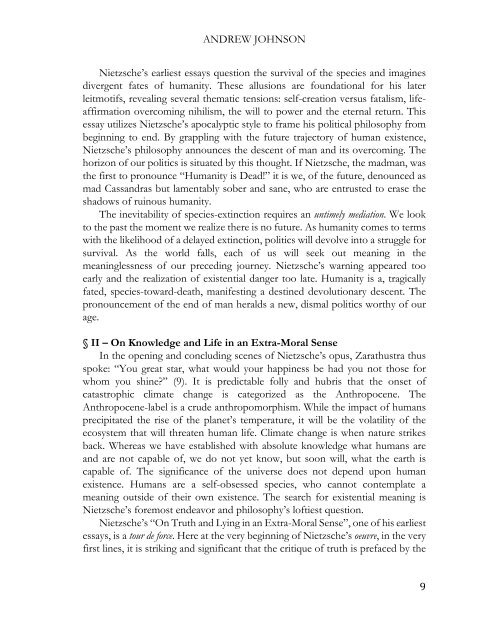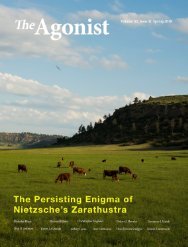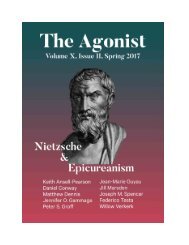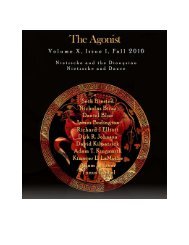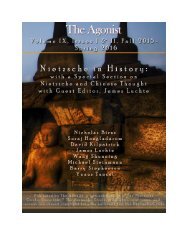Volume XII, Issue II, Spring 2019
You also want an ePaper? Increase the reach of your titles
YUMPU automatically turns print PDFs into web optimized ePapers that Google loves.
ANDREW JOHNSON<br />
Nietzsche’s earliest essays question the survival of the species and imagines<br />
divergent fates of humanity. These allusions are foundational for his later<br />
leitmotifs, revealing several thematic tensions: self-creation versus fatalism, lifeaffirmation<br />
overcoming nihilism, the will to power and the eternal return. This<br />
essay utilizes Nietzsche’s apocalyptic style to frame his political philosophy from<br />
beginning to end. By grappling with the future trajectory of human existence,<br />
Nietzsche’s philosophy announces the descent of man and its overcoming. The<br />
horizon of our politics is situated by this thought. If Nietzsche, the madman, was<br />
the first to pronounce “Humanity is Dead!” it is we, of the future, denounced as<br />
mad Cassandras but lamentably sober and sane, who are entrusted to erase the<br />
shadows of ruinous humanity.<br />
The inevitability of species-extinction requires an untimely mediation. We look<br />
to the past the moment we realize there is no future. As humanity comes to terms<br />
with the likelihood of a delayed extinction, politics will devolve into a struggle for<br />
survival. As the world falls, each of us will seek out meaning in the<br />
meaninglessness of our preceding journey. Nietzsche’s warning appeared too<br />
early and the realization of existential danger too late. Humanity is a, tragically<br />
fated, species-toward-death, manifesting a destined devolutionary descent. The<br />
pronouncement of the end of man heralds a new, dismal politics worthy of our<br />
age.<br />
§ <strong>II</strong> – On Knowledge and Life in an Extra-Moral Sense<br />
In the opening and concluding scenes of Nietzsche’s opus, Zarathustra thus<br />
spoke: “You great star, what would your happiness be had you not those for<br />
whom you shine?” (9). It is predictable folly and hubris that the onset of<br />
catastrophic climate change is categorized as the Anthropocene. The<br />
Anthropocene-label is a crude anthropomorphism. While the impact of humans<br />
precipitated the rise of the planet’s temperature, it will be the volatility of the<br />
ecosystem that will threaten human life. Climate change is when nature strikes<br />
back. Whereas we have established with absolute knowledge what humans are<br />
and are not capable of, we do not yet know, but soon will, what the earth is<br />
capable of. The significance of the universe does not depend upon human<br />
existence. Humans are a self-obsessed species, who cannot contemplate a<br />
meaning outside of their own existence. The search for existential meaning is<br />
Nietzsche’s foremost endeavor and philosophy’s loftiest question.<br />
Nietzsche’s “On Truth and Lying in an Extra-Moral Sense”, one of his earliest<br />
essays, is a tour de force. Here at the very beginning of Nietzsche’s oeuvre, in the very<br />
first lines, it is striking and significant that the critique of truth is prefaced by the<br />
9


